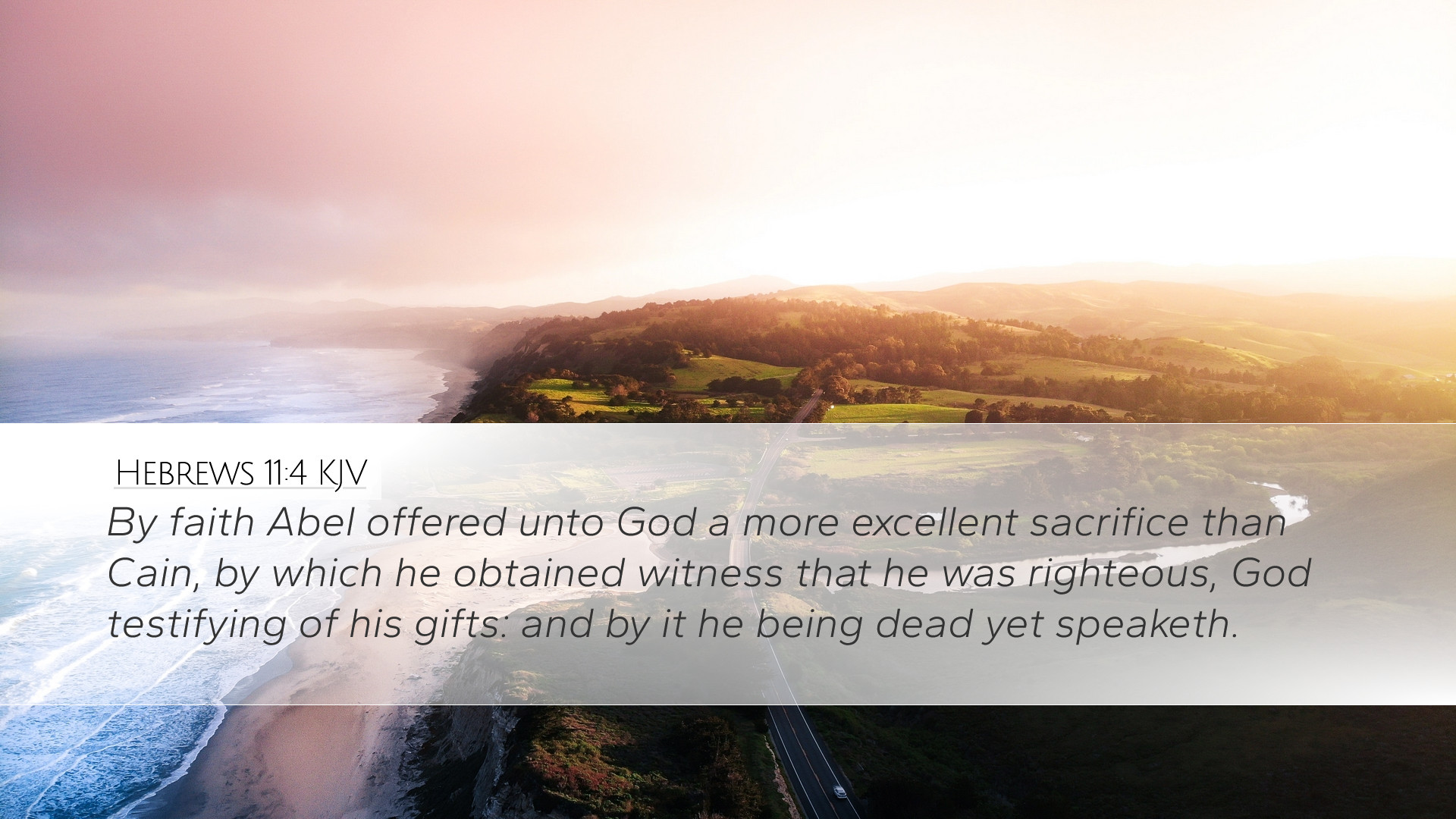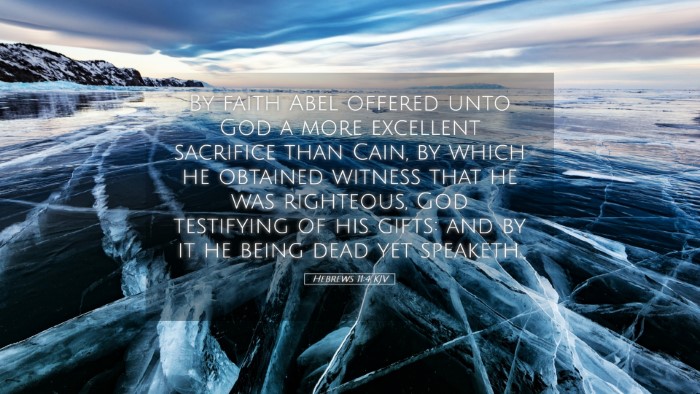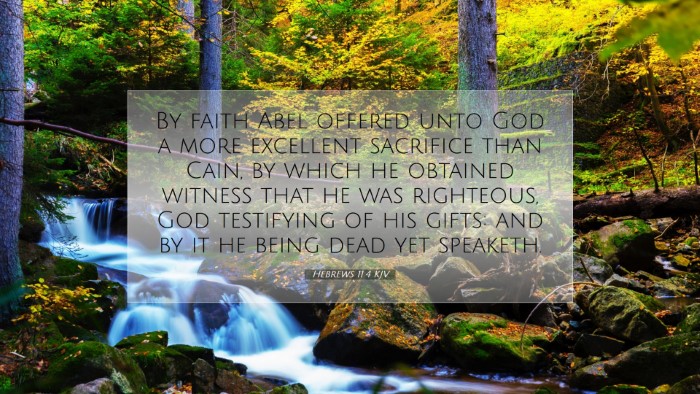Hebrews 11:4 - Commentary and Insights
Verse: "By faith Abel offered to God a more acceptable sacrifice than Cain, through which he was commended as righteous, God commending him by accepting his gifts. And through his faith, though he died, he still speaks." (ESV)
Introduction
The verse Hebrews 11:4 stands as a critical illustration of faith in action, showcasing how one's faith is accepted by God through righteous deeds. This verse encapsulates the essence of Abel’s faith and his offering, contrasting it with Cain’s neglectful attitude towards God. The enduring legacy of Abel serves as an encouragement for believers to pursue a faith that is not only expressed in words but also in righteous actions.
Background Context
This verse is situated within the “Faith Hall of Fame” of Hebrews 11, which illustrates the foundational role that faith has in the life of believers. Hebrews was written to early Christians facing persecution, urging them to remain steadfast in their faith. The author draws from Old Testament examples, emphasizing that true faith manifests through tangible actions and a relationship with God.
Commentary Insights
Matthew Henry's Commentary
Matthew Henry emphasizes the significance of faith in Abel's offering. He notes that Abel’s faith was characterized by sincerity and a sincere commitment to God. Henry points out that Abel offered “a more excellent sacrifice” not merely because of the material aspect but due to the faith that accompanied the act. It was the heart, not the gift, that God valued.
- Righteousness: Henry clarifies that Abel was pronounced righteous not through his works alone but through faith. This reinforces the theme that righteousness comes by faith and is recognized by God.
- God’s Acceptance: The acceptance of Abel’s offering signifies that God is attentive to the disposition of the heart. Abel's offering was accepted, indicating that God delights in a genuine relationship enriched by faith.
- Legacy of Faith: Henry notes that Abel’s faith continues to speak through generations, emphasizing the ongoing impact of living a life devoted to God.
Albert Barnes' Commentary
Albert Barnes delves deeper into the narrative of Abel and Cain, explaining how Abel’s offering was better accepted due to its nature and the faith behind it. Barnes remarks that Cain’s offering stemmed from his own understanding, lacking adherence to the divine standard set by God.
- Better Sacrifice: Barnes observes that the term "better" refers not only to the material quality of the sacrifice but its worthiness before God—Abel's sacrifice being offered in faith led to its acceptance.
- Faith's Expression: He emphasizes that Abel’s act was an expression of faith, a reflection of one's loyalty to God and an understanding of divine expectations.
- Abel's Enduring Faith: Barnes notes that despite Abel's tragic death, his faith lives on, serving as an eternal reminder of the importance of sincere devotion and sacrifice unto God.
Adam Clarke's Commentary
Adam Clarke contextualizes the relationship between the offerings of Abel and Cain, examining the idea of faith as foundational to a proper worship experience. Clarke presents the notion that spirituality is not solely in outward acts but in an inward state of faith and obedience to God.
- Nature of Worship: Clarke argues that true worship must stem from a heart that genuinely seeks God, highlighting that Abel’s sacrifice was a reflection of his personal faith.
- Contrast Between Two Brothers: He delineates the differences in attitude between Abel and Cain, asserting that Cain’s rejection was rooted in pride and self-reliance, leading to diminished acceptance.
- Symbol of Christ: Clarke also points out that Abel's acceptance foreshadows Christ's sacrifice, which would also be acceptable to God due to its perfection and purity.
Theological Reflections
Through the lens of this verse, several theological reflections emerge which are vital for pastors, students, and scholars:
- Faith and Righteousness: The connection between faith and righteousness flows throughout Scripture. Abel's faith serves as a model for contemporary believers, illustrating that true worship must arise from an authentic faith.
- The Nature of Sacrifice: In understanding worship, this passage emphasizes that it is not the act that defines worship but the faith behind it. This calls for a deeper introspection into the motives behind our offerings to God.
- Legacy of Faith: Abel’s experience encourages believers to consider their legacy—what will be said of our faith after we are gone? Abel’s continued legacy serves as a profound reminder of living out faith in tangible ways.
Conclusion
Hebrews 11:4 not only narrates historical events but transcends time, reminding believers to cultivate a faith that produces righteous acts. The insights drawn from our esteemed commentators serve to inform our understanding that faith is alive, active, and deeply relational. As we reflect upon Abel's offering, may we seek to offer our lives as living sacrifices, acceptable and pleasing to God, rooted in genuine faith in Christ.


